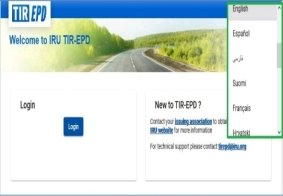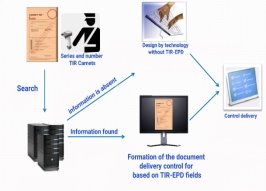Keywords: Code, customs authorities, law, customs border, customs officer, economic security, TIR-EPD international customs information system, declaration, transport, Convention, preliminary analysis, TIR Carnet, Administrative Offences, nomenclature, duties and taxes.
As a result of the tireless efforts of our Esteemed President Serdar Berdimuhamedov, a number of legal measures aimed at further strengthening the security of the State are being implemented for military personnel. At the same time, our customs officers also make a great contribution, using international experience related to the protection of the customs border and the economic security of the country, speeding up the movement of goods crossing the customs border. The TIR-EPD (TIR — “Transport International Routier”) (EPD — “Electronic Pre-Declaration”) customs information system controls the legal declaration of commercial and personal goods crossing the customs border of the country and facilitates the exchange of customs declarations. This international customs information system facilitates the correct and risk-free clearance of goods crossing the customs border. In addition, the TIR-EPD customs information system has developed a number of conditions that facilitate and accelerate the payment of customs duties. This customs information system operates on the basis of the laws of the International Transport Convention. This Convention was adopted by the Economic Commission for Europe on November 14, 1975. The main purpose of the International Transport Convention is to ensure the safe transit of goods in accordance with the rules and regulations established in the Convention.

The TIR system ensures the rapid movement of more than 3.2 million customs documents per year. TIR-EPD is a customs transit document serving as a customs declaration and tax payment guarantee. The administrative center of the TIR-EPD customs information system is located in Bern, the capital of Sweden.
The TIR-EPD customs Information System currently operates in 32 countries around the world. These are: Austria, Azerbaijan, Afghanistan, Belarus, Belgium, Bulgaria, Bosnia and Herzegovina, Hungary, Germany, Greece, Georgia, Israel, India, Iran, Italy, Kazakhstan, Qatar, Kyrgyzstan, China, Latvia, Lithuania, Moldova, Mongolia, UAE, Oman, Pakistan, Poland, Russia, Romania, Saudi Arabia, North Macedonia, Serbia, Slovakia, Slovenia, Tajikistan, Turkey, Uzbekistan, Ukraine, Finland, France, Croatia, Czech Republic and Estonia. In the State Customs Service of Turkmenistan, with the support of the International Road Transport Union (IRU), work began on the introduction of IT tools in July 2020. This year, Turkmenistan has entered the ranks of users of this electronic system. In addition, TIR-EPD has the ability to manage the customs information system in 18 languages. These are: English, Arabic, Bulgarian, Hungarian, Chinese, Lithuanian, German, Polish, Romanian, Russian, Serbian, Slovak, Turkish, Persian, Finnish, French, Croatian and Czech. Thus, there is a possibility of introducing our state language — Turkmen language — into the TIR-EPD international customs information system. This will facilitate the management of the system and make it more accessible to our military and customs officers. At the same time, electronic processing of transport documents or declarations and preliminary analysis of information about goods will provide exchange opportunities in a short time.

It should also be noted that the TIR-EPD customs information system automatically checks the validity of the TIR Carnet preliminary electronic declaration against the database of the International Road Transport Union (IRU) and ensures customs security of doing business. After that, it allows you to inform participants about the transportation on the auto-crossings of all countries at the same time. So Articles 391–394 of the Code of Turkmenistan on Administrative Offences also play an important role in the prevention of offenses [3].
There are several requirements for managing the TIR-EPD customs information system. TIR-EPD allows to connect to the customs information system through the following stable Internet networks:
– Optical Fiber, Cable, xDSL, 4G, 5G...
– → Web Browser:
• Microsoft Edge version 107.0 and higher.
• Mozilla Firefox: version 100.3 and higher.
• Safari: version 15.6.1 and higher.
• Google Chrome: version 108.0 and higher.
• Opera: version 87 and higher.
In order for Customs authorities to have access to the TIR-EPD service, it is necessary to develop a software module (the TIR-EPD data exchange system). No one, not even the IRU, has access to the customs database. This is due to the fact that the TIR-EPD data exchange system sends and receives only encoded messages related to TIR operations. Thus, in accordance with Article 21 of the Customs Code, the exchange of information in this electronic system is carried out on the basis of legislation approved by the authorized state body in the field of customs in the field of commodity nomenclature of foreign economic activity [1].

The TIR-EPD electronic customs information system makes it possible to facilitate the calculation of customs duties and taxes in case of violations with respect to customs duties specified in Articles 270–271 of the Customs Code of Turkmenistan [1]. Also, in accordance with Article 407 of the Code of Turkmenistan on Administrative Offenses, violation of the terms of payment of customs duties is prevented [3]. This electronic customs information system has built-in the ability to pay customs payments in different currencies. It also provides payment via credit cards and bank transfers. At the same time, this TIR-EPD customs information system provides an opportunity to issue an invoice to the person who paid the payment.
References:
- Customs Code of Turkmenistan. — A.: TDNG, 2010. — No. 137-IV.
- Handbook of the TIR Convention/ECE/TRANS/TIR/6/Rev.9
- The Code of Turkmenistan on Administrative Offences. — A.: TDNG, 2013. — No. 137-IV.
- https://www.awtoulag.gov.tm/
- https://tirepd.iru.org/
- https://www.customs.gov.tm/

